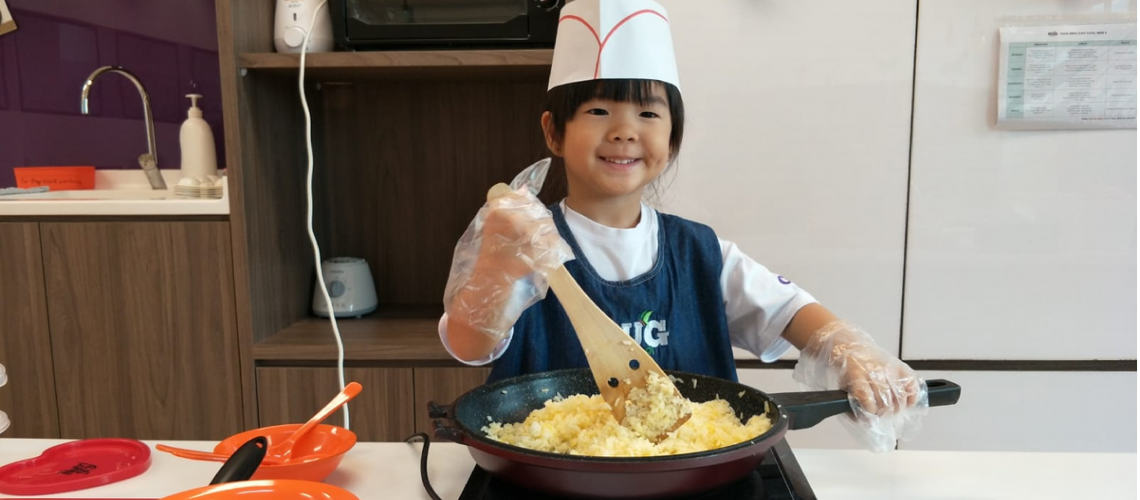Today’s reality is that most of us are busy working, ensuring the children complete the homework and taking care of other household responsibilities. Since it is the holiday period and more families are home, why not use this time to explore cooking with your child? It gives you time to share, bond and work together.
There are many reasons why some parents prefer to cook and bake solo in the kitchen. It can be quicker, less messy and easier to manage. It is not always smooth-sailing when you need to take care of young children at the same time, but the kitchen can be one of the most fun places for children to play and learn.
When is it a good time to introduce cooking to your child? You don’t have to wait until they’re old enough to be on Junior Masterchef to get them started! Once children can understand the basic kitchen safety rules, they’re ready to learn food-based independence and have fun. In GUG Preschool, our children are exposed to cooking lessons from as young as 3 years old. Not only will they learn cooking skills, but they learn important lessons which are applicable to life and academics.
For a start, preschoolers learn a lot from watching, so let them in the kitchen to see how dishes come together. Encourage them to feel, taste and even play with the food along the way. And if your children are picky eaters, get them to help out in the kitchen! It will encourage them to take an interest in their food and they are more likely to eat it later on. Exposure to cooking helps children develop a mature palate and a taste for fresh, wholesome ingredients. The earlier they are used to eating nutritious, whole foods, the less likely they are to acquire a taste for processed food.
Here are 5 important things that we teach and encourage during our cooking classes in GUG, and we hope you can do likewise with your children at home.
- Teach Sequencing
There are many child-appropriate recipes that you can find online, many of which are a lot like puzzles. Each ingredient and cooking process creates a new masterpiece of a dish. Encourage children to think about the step-by-step sequence as they observe or experience the progress of cooking. Sequencing is an important concept for preschoolers as it is a key skill in storytelling, math, science and practical life tasks. Ask your child to think and explain what comes next. With every step done right, kids feel empowered and continue to build their self-confidence.
- Encourage Evaluation
When finished, encourage your child to evaluate the taste and express an opinion on the outcome — whether it’s sweet or sour, too salty or too hard, and ask what else can be done to improve the dish. Other than problem-solving, this is also a fun way to build vocabulary and language skills.
- Participate With 5 Senses
Being in the kitchen gives children the opportunities to practice their hand-eye coordination and learn through their five senses. These include simple actions such as pouring from a measuring cup into a bowl, cracking open an egg, kneading dough and being able to sprinkle sugar into the mix. Although children are bound to spill or break things along the way, you can certainly help to minimize such incidents as well as ensure greater kitchen safety by giving your child plastic bowls, cups and knives, or food cutters designed for the young ones. - Allow Independence
When children begin to prepare food in the kitchen, it is essential that you teach them rules like washing hands before prep, and being careful around sharp or fragile objects. As parents, it is our responsibility to assess how well our children can abide by these rules before we let them work freely in the kitchen. Once we overcome this barrier, plan out small steps for children to develop their independence in creative and fun ways. Instead of allowing them to wait for their snack to be made, let them have the responsibility to make their own. Provide some ingredients where they can mix and match to create their own healthy snacks whenever they are hungry. It makes them feel accomplished, boosts their confidence and there is nothing cuter than watching children eat what they have made and proudly sharing it with others! - Develop Social Skills
Encouraging hands-on food preparation gives children a tremendous amount of social skills practice. This includes collaborating on recipes, preparing food and even learning how to serve meals for others to enjoy. Activities such as making pleasant conversation, good table manners and the fine art of saying please and thank you — all involve learning and practicing skills central to a happy social life. This is also the best time to start the habit of cleaning up. Preschoolers can learn to wipe away spills with a cloth, wash dishes, sweep up any scraps on the floor and return their ingredients and tools to their proper places. Teamwork and orderliness make kitchen work more fun for everyone, even parents.
Cooking and eating are part of a daily routine that we go through, but it can also be a time to teach valuable skills, share some laughs and bond with our children over delicious creations. That’s why in GUG Preschool, we advocate food preparation and hands-on cooking because we know that children learn best when they are busy having fun! And with specially-developed curriculum and teaching methods, our team of educators make this happen every day in school so that children build strong foundations and start good habits young.








